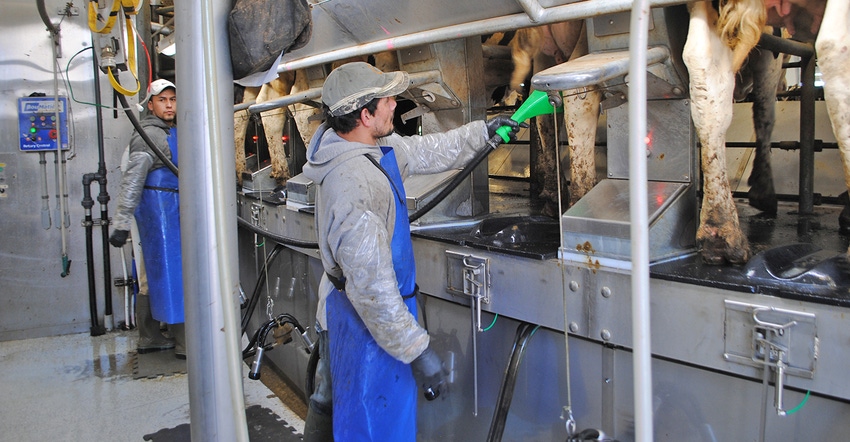February 7, 2018

By Trisha Wagner
The increasingly important role that immigrant workers play in Wisconsin’s dairy industry is relatively new. On average, dairy farmers started hiring immigrant labor around the year 2000. However, Latino immigrants have worked on the Upper Midwest’s vegetable farms seasonally since at least the 1930s, and the region’s meatpacking and food-processing industries have relied on immigrant workers throughout the 20th century.
According to a study by the University of Wisconsin Program on Agricultural Technology Studies, many Wisconsin dairy farms now hire employees versus relying on family labor alone. The study cites many reasons for this. Wisconsin dairy farmers have increased herd size to pursue a strategy of increased production to make ends meet or increase farm income. Tighter farm budgets may also compel members of farm families to seek off-farm work for a secure income base and/or health insurance. Additionally, farm families (like U.S. families, in general) are declining in size; spouses and farm children increasingly seek off-farm careers; and the average age of Wisconsin dairy farmers is increasing. These trends further lead to the need for hired employees.
Tough to find U.S. workers
Farmers interviewed in UW surveys reported difficulties finding U.S.-born workers willing to fill dairy farm jobs. Farmers said many young people in rural Wisconsin have little desire to work on dairy farms, and it is hard to find U.S.-born people willing to work long hours, night shifts and weekends.
One Wisconsin dairy farmer said: “So as our last two children entered high school, and I realized that soon I would have no family labor to rely on, we moved our farm to all hired labor. I have not been able to hire an American citizen since 1997. I have tried! The way I see it, if we didn’t have Hispanics to rely on for a workforce, I don’t believe I could continue farming.”
Farmers insist that this demographic shift in the dairy labor force is not an effort to undercut the local wage rate but, instead, to find “reliable,” hardworking, year-round employees willing to work the demanding hours and do the necessary tasks.
In the words of another Wisconsin dairy farmer: “It’s not about Hispanics. It’s about who wants to do the job. We don’t get a lot of applications from people who want to do the job. There are lots of myths out there. … In our area, you hear from some people that these people [Hispanics] are taking jobs away. But the fact of the matter is that there is nobody here who will work for those wages. The folks in ag cannot afford to pay those wages.”
Declining rural population
There is no doubt that in recent years, residents have fled rural counties in Wisconsin, and many of them are young people. Between 2000 and 2010, Wisconsin’s population grew by 6%, but more than a quarter of Wisconsin’s 72 counties lost population. Most of those losses were in rural areas where the main industry is agriculture. Jackson County lost 7% of its population during that time frame.
Immigrant workers and their families bring their skills and ambitions into Wisconsin, breathing new life into the state’s rural communities. Hired workers, regardless of origin, boost the strength of the state’s dairy industry and also enable dairy farmers to take vacations and have some time off during the day to attend their children’s sporting events or other community activities.
Although immigrant employees are a crucial component of the economic viability of dairy farms, the employer-employee relationship is fraught with legal and economic vulnerabilities. Some immigrant farm workers lack legal authorization to work and live in the U.S., which exposes both employers and employees to increased risk, threatening agricultural investment.
Wisconsin’s growing reliance on immigrant labor presents challenges, yet can also serve as a call to develop programs and policies that will improve conditions for immigrant employees and families, as well as maintain a dependable farm labor force.
For the benefit of the families who farm and Wisconsin’s dairy industry, a secure dairy farm labor force is necessary. This means we must honor immigrants as human beings: members of the communities in which they live and to which they contribute, possessing dreams and ambitions, and deserving a full array of human rights and freedoms. More information on the UW Program on Agricultural Technology Studies can be found at pats.wisc.edu.
Wagner is the Extension agriculture agent in Jackson County, Wis. This column is provided by the University of Wisconsin Extension Dairy Team.
You May Also Like




